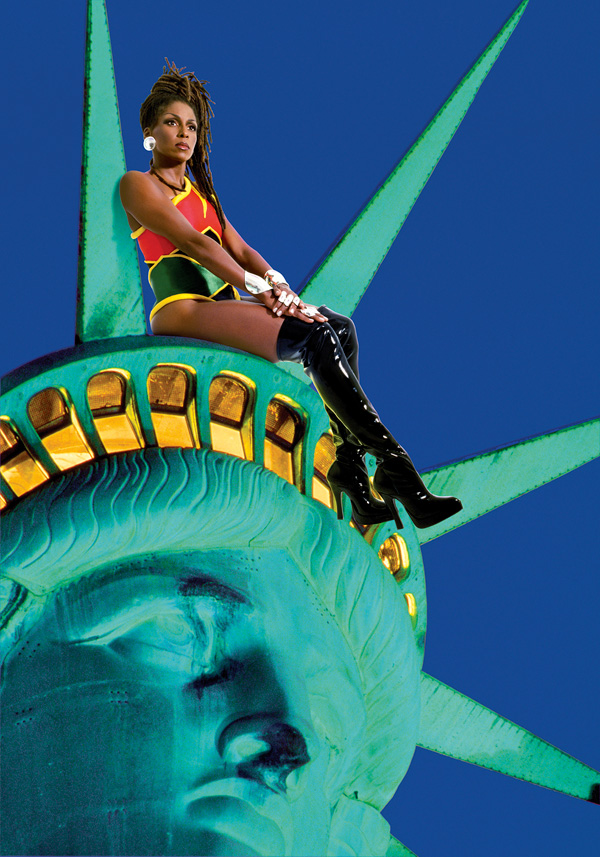Renee Cox, Chillin’ with Liberty, 1998. Ciba Chrome print, 40 x 60 inches.
This post is part of a series marking the 40th anniversary of Paul Robeson Galleries. We are celebrating the artists who we have had the pleasure of working with over the last four decades, highlighting those artists who have inspired, provoked, challenged, and enriched our lives.
Artist Biography
Renee Cox works in photography, photocollage, and mixed media installations. Her work centers around “taking the stereotypical representations of women and turning them upside down, for their empowerment.”[1] Cox studied photography at Syracuse University and received her Master of Fine Arts degree at the School of Visual Arts, New York in 1992. Subsequently, Cox participated in the Whitney Independent Study program. Cox later became an editorial photographer for ESSENCE magazine. In her early thirties, Cox made the transition from magazine to fine art photography.
Cox is the recipient of several fellowships and awards, including the Gold Rush Awards Honoree, Rush Philanthropic Arts Foundation, Brooklyn (2015); Aaron Matalon Award, National Gallery of Jamaica, Kingston (2007); Chrysalis Award, Museum of Contemporary African Diaspora Arts, Brooklyn (2006); and New York Foundation for the Arts Artist Fellowship (1996). She has undertaken residencies at Light Works, Syracuse (1997), and The MacDowell Colony, Peterborough (1996). Cox’ has exhibited at venues including Herbert F. Johnson Museum Of Art, Cornell University, Ithaca (1997); Fin de Siecle, Nantes (1999); School of Art, Yale University, New Haven (2016); Whitney Museum of American Art, New York (1993); Pace/McGill Gallery, New York (1995); Smithsonian Anacostia Community Museum, Washington, DC (2000), among many others. In addition to her impressive list of shows and works, Cox has taught at New York University and lectured at multiple institutions such as The Maryland Institute College of Art, Baltimore (2009); Massachusetts College of Art, Boston (2006); Columbia College, Chicago (2007); University of Maryland, College Park (2005); Art Basel Miami (2015); Yale University, New Haven (2018, 2016, 2009); and The Frances Young Tang Teaching Museum and Art Gallery at Skidmore College, Saratoga Springs (2018). She lives and works in New York, New York.
About the Art
From her early work, Renee Cox presented social issues in a raw and visceral way that polarized audiences. This marriage of distinct style and subject cemented her as one of the most controversial Black artists working today. Her mixed media piece, It Shall Be Named (1994), shows a Black man’s distorted body made up of eleven separate photographs hanging from a cross, positioned to resemble a lynched man as the crucified Christ. Later in her work Cox would often use her own image. The artist once said, “The main inspiration for my work comes from my life experiences. I use myself as a conduit for my photographs because I think that working with the self is the most honest representation of being. I am working toward regaining a ‘self-love…’.”[2]
With her work rooted in both Blackness and feminism, in the mid-1990s Cox began one of her most contentious bodies of work to date. In the series, Flipping The Script, Cox took many European Christian religious figures and re-imagined them as Black people. The spark of the controversy would be her photo, Yo Mama’s Last Supper (1996): Cox remixed Leonardo Da Vinci’s Last Supper (circa 1490s), with a nude Cox sitting in for Jesus Christ, surrounded by all Black disciples, except for a white Judas. In 2001, this work ignited a maelstrom of controversy when it was shown in the exhibit, Committed to the Image: Contemporary Black Photographers at the Brooklyn Museum. Many Roman Catholics were outraged by the photograph. The photo garnered the attention of Cardinal Egan of the New York Archdiocese and New York City Mayor Rudolph Giuliani. Mayor Giuliani called for the forming of a commission to set “decency standards” to keep such works from being shown in any New York museum that received public funds.[3] Events such as this are a testament to Cox’s dedication to truth through art and the pushing of societal norms for the sake of greater understanding.
[1] “Renee Cox,” Feminist Art Base, Elizabeth A. Sackler Center for Feminist Art, BrooklynMuseum.org, https://www.brooklynmuseum.org/eascfa/about/feminist_art_base/renee-cox. Accessed April 2020.
[2] Ibid.
[3] Elisabeth Bumiller, “Affronted by Nude ‘Last Supper,’ Giuliani Calls for Decency Panel,” The New York Times, February 16, 2001.
